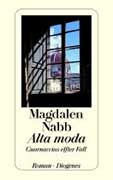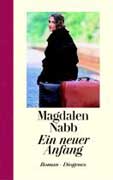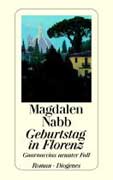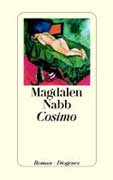Exclusive Interview with Magdalen Nabb
©2004 italian-mysteries.com
Florence, Italy
September 10, 2004
Part Five - Publishers & Book Events
|
|
Magdalen Nabb's Guarnaccia-Mysteries
have been published in the following countries:
Country
Germany, Austrian Switzerland
United States
United Kingdom
France
Italy
The Neterlands
Greece
Portugal
Croatia |
Publisher
Diogenes Verlag
Soho Press
William Heinemann
Ed. 10/18
Passigli Editori
Uitgeverij Sirene
Metaichmio Publications
Livros do Brasil
Mozaik Knjiga |
Q: Are you happy with your current Italian publisher, Passigli?
Nabb: Yes, they’re all right. As far as I’m concerned I publish in Italy because it’s nice to be able to give my friends a book. Especially, the people who helped me. All the Carabinieri who worked for me and helped me. I had to have books for them. So it has to be done and done properly. I don’t make any money out of them.
Q: Do you do the translation, when your books are published in Italian?
Nabb: I have to work on them. I’m obliged to work on them. We just finished one now, The Marshal Makes His Report. So I have a translator, I get specific text, but I have to do much of it again. When I’m writing about Italian things, my characters are Italian so I’m having to translate into English--the system, culture, and ideas. They don’t exist in English. I’ve got to render them somehow in English. And also the Florentine dialect I have to somehow render into a colloquial English. And it’s very difficult. When it has to go back into Italian, it has to go back where it came from--it can’t just be translated word for word. So, a translator can’t deal with that. Say, I’ve taken a very common Florentine saying and Anglicized it then somebody has to understand where it came from to put it back into Florentine.
For the first four, I got my son to do that, because he knew exactly in both languages what I was doing. So that was not a problem, but he hasn’t got time to do the others. So the translator just gets the whole thing done and then I have to redo all those things. And then my friend the Captain--he’s a General now--checks through to find any error in procedure that may have got past him when he read them in English. So he likes to read them in Italian to make sure there isn’t some little blip in procedure.
It’s a real annoyance that they’ve changed the uniforms. They used to wear Khaki in the summer--so some of my old books have got Khaki uniforms in the summer and now they’ve been translated into Italian, but now we never know what to do about that. They’ve got a different legal system since when I started, too.
Q: How are the books received by the Italians?
Nabb: Oh, they like them. The Florentines enjoy them enormously. With the exception of one Florentine who is a lawyer and he writes crime books. He naturally feels I’m an intruder.
Q: How many of the books have been translated into Italian, so far?
Nabb: Seven have already been done, but we are redoing the first four. They are the four seasons books which my son did with the publisher Rusconi which then was sold off. So I took my rights back and I got a new publisher, Passigli, who is here in Florence. Last September (2003) Property of Blood came out and we presented it in Mantua. Have you ever been to the Festival at Mantua? They have a huge literature festival and we presented this book there (see below). It’s an international festival but Mantua is small. It has two streets--one goes here and one goes there. They’ve got millions of cows. The whole place smells of cows. Mantua is absolutely beautiful. The architecture is wonderful. It’s extraordinary that they have this festival because I don’t think they even have enough hotels to do it with. You wake up in the morning and you smell this cows. But it’s an excellent festival and they get huge names. I was there with Michael Dibdin because we have the same publisher, in Italy.
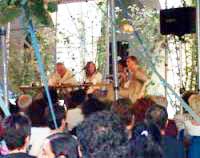 |

Magdalen
Nabb
|

Michael
Dibdin
|

Corrado
Augias
|
2003 Festivaletteratura, Mantua
Corrado Augias, Michael Dibdin, Magdalen Nabb
"IL BEL PAESE" (The Beautiful Country)
Due scrittori europei di thriller italiani
(Two European writers of Italian thrillers)
| This event celebrated the English thriller set in Italy with the presence of two authors, Magdalen Nabb and Michael Dibdin. Just as in any spy thriller worthy of the name, the evening reserved a surprise development. During the presentation of the authors by Corrado Augias, who should walk in but the president of the European Union Commission, Romano Prodi. After this unexpected interruption, Augias resumed his discussion, taking us through our virtues and vices as seen through the eyes of foreigners. It has often been said that the crime story is an ideal vehicle for the examination in detail of th environment and context in which it is set.
Nabb confessed to a love of the Florence of the artisans whilst Dibdin, in dodging Augias’s questions, showed that he’d learned something from our politics.
|
Era l’evento deputato a celebrare il thriller di matrice inglese, Magdalene Nabb e Michael Dibdin gli autori presenti, ambientato nella penisola italica. Come in ogni spy-story che si rispetti, anche questo incontro ha avuto il suo colpo di scena: durante la presentazione, ad opera di un appassionato Augias, si è presentato a sorpresa al Chiostro del Museo Diocesano il presidente della Commissione dell’Unione Europea Romano Prodi, accolto da un’ovazione. Al seguito di questa inaspettata interruzione, l’amico Augias ha ripreso il filo del discorso portandoci a spasso insieme a Dibdin e alla Nabb attraverso vizi e virtù esaminati dagli stranieri, perché, secondo un’opinione ribadita a più riprese, il giallo è un ottimo viatico per descrivere in dettaglio il contesto, l’ambientazione dell’opera. Mentre la Nabb ha confessato il suo amore per una Firenze città dell’artigianato, dove era andata la prima volta per un corso di ceramica senza più tornare, Dibdin, che ambienta i suoi gialli a Venezia o a Napoli, abilissimo nell’ evadere le domande di un pressante Augias, ha dimostrato di aver imparato molto dalla nostra politica.
|
Q: Are you pleased with your German publisher, Diogenes?
Nabb: The German-language market is huge. A huge market for all of us. They like crime, they love Italy, and they buy books--a massive amount of books. I sell more books in Germany than anywhere else. That is because Diogenes is the best publisher in Europe and one of the best in the world. If you’re published by them, you're home and dry. I left my English publisher and put everything with them. Occasionally, they whisk me away to book events. Mostly, I’ve been to Germany and Switzerland and Austria.
Q: When we were discussing Simenon, you said that had Diogenes approached you early in your writing career. Will you elaborate on that?
Nabb: I think it probable that Simenon mentioned my work to Diogenes, his publisher, because they rang me--they didn’t go to my publisher.The owner of the publishing house, Daniel Keel, called me himself. He said, “I don’t publish a book, I publish a writer, which means if you come to me, I publish everything that you do.” And he asked me visit Zurich which I did and I spent the day with him. He clearly wanted me to move everything I owned in the world to him, then. But I didn’t know who he was—I was a beginner and I didn’t know anything about anything, then. I couldn’t imagine why I should go to a German language publisher. It just seemed so strange. I was completely perplexed by this. But it’s what he wanted. And I wish I had known then what I know now because I would have gone. But it just seemed so bizarre, really. He had published Patricia Highsmith. He made her famous when nobody would publish her. And he published her paintings. Did you know she used to paint? Before she died she moved to Switzerland and she called Dani up and she said there’s a big trunk over there and it’s for you. It was all of her paintings and he published them. It was very interesting.
I think that Simenon must have made this move for me. But I didn’t know anything about it at the time. Daniel Keel is a brilliant publisher, a genius and a great primadonna. I love him. It’s because my then English pulisher had no contact with Diogenes that I suspect it was Simenon who helped me in this as in so many things.
Q: Tell us about your participation in Bouchercon 2001 Conference in the Washington D.C. area.
Nabb: I did the Bouchercon which was quite an alarming experience. I was going to New York because I had just started publishing with Soho and met them. They sent me there. I was dispatched. You know why fans are fans--because they’re fanatics. And they talk to you and they say, “Ms Nabb, in your penultimate book, in Chapter Nine when the marshal said... Did he mean?...”
I signed a million books. And the queue went on forever. Some people had twenty books. Because they went back to 1980. I’m amazed by them. They weren’t carrying three copies of the same book. These people were carrying my book from 1980. And I was amazed that anyone knew who I am because I had interrupted publishing in America when Charles Scribner was sold. I did a couple of books with HarperCollins in New York, but then I didn’t do anything for like seven years, so nobody would know who I am. Instead there was this impressive queue of people with books I hadn’t seen for years myself. They wanted them all signed. So I did all that--that was fine. I’m not used to this sort of thing.
I just locked myself in my room, until I met Cara Black. I was scared to death. You have to realize I spend my time with policemen. Those fans were really scary. There was one man who was a policeman from Boston or somewhere and he was on his knees in front of me. I said, “Get up, please. You look like you’re proposing to me.” “Oh, no Ms Nabb, because I’m married.” Some of these people are completely crazy. I was scared to death. I just shut myself up in my room until I met Cara on this panel and she said, “I’ve got some Champagne.” So once I’d met her, we had fun. Some of those people go from convention to convention. They must have enough money to do that. They don’t do anything else. Where does their money come from? I had never seen these people before. It was really alarming. So I locked myself up until I met Cara and then we started having fun.
We had a lot of fun. I remember on the last evening when there was some kind of official banquet. I said, “No way.” We went to the cocktails first. We will go and we will speak to everybody we know so we will have been seen. And then we snuck out. We got in a cab and went to Joe’s or something. This restaurant where we ate fish. Basic food and lots of Champagne. Afterwards, we had to sneak back in. So who did we meet coming back in, the organizer of our panel and she was sneaking back in also and she had been to a football match. I would never go to these things, but Soho made me go. Well, I did my duty but my duty did not include eating that banquet menu.
|
|
|





